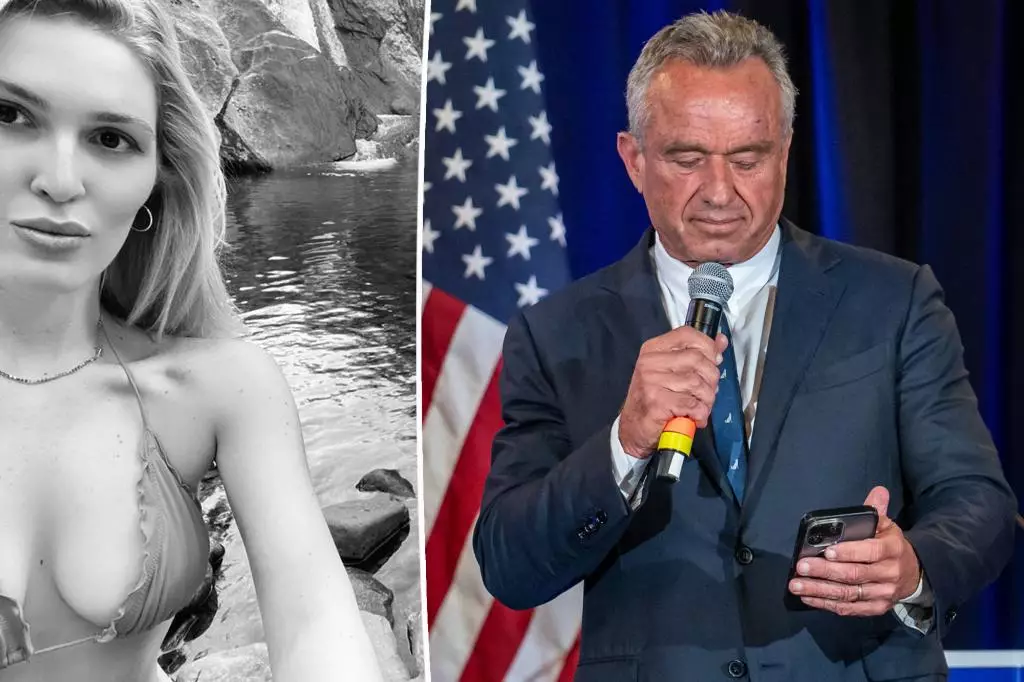In the world of politics, few surnames carry as much weight as the Kennedy name. Recently, this legacy has been entangled in a drama that combines elements of ambition, journalism, and an unexpected romantic affair. The relationship between Robert F. Kennedy Jr., a name synonymous with American political heritage, and Olivia Nuzzi, a writer for New York Magazine, sheds light on how personal and professional lives can collide in scandalous fashion. This article aims to unpack the intricate layers of their relationship, illustrating how love, ambition, and public scrutiny can form a potent cocktail that resonates beyond private lives into the public domain.
Initially, Nuzzi was repulsed by Kennedy’s overtures, reflecting a common reality where initial impressions may not hold true in the grander scheme of relationships. Following a seemingly clumsy pass made in October, both participants found themselves in a swirling vortex of messages and encounters that led to profound emotional connections. The term “love bombing” comes to mind — a psychological tactic used to manipulate someone through excessive affection and attention. As Nuzzi began to receive affection-laden texts, she found herself drawn to Kennedy, transitioning from disdain to infatuation over several months. This metamorphosis raises questions regarding the psychological implications of intense emotional attention and its ability to alter perceptions and foster attachment.
For nearly a year, Nuzzi juggled her burgeoning relationship with Kennedy alongside her long-term engagement to journalist Ryan Lizza. This dichotomy speaks volumes about the human condition—how love can inspire both joy and turmoil. Nuzzi managed two identities: a public persona as a dedicated journalist and a private self that yearned for connection in what could only be described as a complex emotional entanglement. Multiple sources indicate that she shared her experiences with friends, indicating her struggles to reconcile her personal life with her perceived passion for Kennedy.
Simultaneously, this dynamic forces us to reflect on the societal expectations tied to fidelity and commitment. As Nuzzi fell deeper into her emotional relationship with Kennedy, her friends noticed a marked change in her demeanor, suggesting that love—whether genuine or entwined with manipulation—can impact one’s character and behavior dramatically.
The professional boundaries between Nuzzi and Kennedy blurred significantly, especially when the two found themselves alone during their public interactions. Rather than maintaining objective distance as journalist and subject, they indulged in ambiguous romantic gestures. For instance, their hiking meetings transformed from professional obligations into emotional rendezvous laden with tension. Kennedy’s insistence on physical proximity, the light-hearted references to their partners, and Nuzzi’s willingness to engage in flirtation indicate a conscious choice to abandon professional discretion.
The ethical implications of such a relationship deserve scrutiny. Nuzzi’s situation raises critical questions about the ethics of journalists engaging personally with their sources. The internal conflict she faced could reflect broader issues facing journalists — the pull between personal relationships and professional integrity—and how this dilemma can manifest in the form of scandals and controversies.
The culmination of this affair brought significant fallout for Nuzzi. Her relationship with Kennedy, once emblematic of passionate romance, swiftly morphed into a source of tension that threatened her career. The revelation of her secretive interactions led to suspension from New York Magazine, prompting a series of investigations. Interestingly, the magazine found no inaccuracies in her reporting, illustrating how personal lives in the media can have unintended consequences that stray from professional responsibilities.
The repercussions extended beyond Nuzzi; Kennedy’s liaison faced public scrutiny, especially given his existing marriage to actress Cheryl Hines. The controversy surrounding their relationship reverberated through media circles, highlighting the often salacious blend of personal lives and public personas. Media gossip and the accusations reflect, perhaps, a societal morbid curiosity regarding the romantic entanglements of influential figures, ultimately adding more layers to an already complex narrative.
The affair between Robert F. Kennedy Jr. and Olivia Nuzzi offers a compelling glimpse into the convoluted worlds of love and ambition. Their relationship illustrates the fragility of personal integrity under the weight of desire and ambition, encapsulating the broader struggles faced by individuals entangled in powerful legacies. As public interest in such narratives continues to grow, it is vital to approach these stories with an understanding of the human emotions that drive them and the ethical dilemmas they present. Beyond the gossip and scandal, this affair serves as a cautionary tale about the unpredictable interplay between personal desires and professional obligations, shedding light on the intricate fabric that weaves and intertwines our shared human experience.

